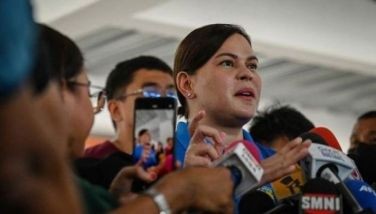High-powered political advisers
October 2, 2003 | 12:00am
It is most remarkable, really, that our top political leaders are now able to seek counsel from the most impressive consultants the planet — nay, perhaps the universe itself – can field. On account of this great fortune, the future of Filipinos must have brightened considerably. The best, as some of our gung-ho political guardians are wont to say, is yet to come, but the best will now certainly be with us just as soon as we can properly pronounce "rumpelstiltskin"!
With these high caliber political advisers counseling our leaders, our nation’s quality of life will surely improve dramatically within the lifetime of the present administration. (Perhaps, assuming a more prudential tone, one ought to say, within the hopefully extended lifetime of this administration.)
How can things be otherwise? In the past, the country was unable to do well because only Singapore’s Lee deigned to freely advise Philippine presidents. Every now and then, an American president might be tempted to add his own ten cents worth and counsel a beleaguered Filipino leader to "cut and cut cleanly." Using general and extremely tactful language, a spiritual leader might also occasionally suggest that more attention be paid by the country’s authorities to the poorest among the citizenry.
Most of the time, however, Filipino leaders were left alone to figure out their increasingly difficult national situation, its various challenges and their possible solutions.
Things are quite different now. Mostly every foreign leader who can situate the Philippines within a thousand miles of its actual location accommodates our confounded authorities with advice on how to effect our political governance, run our economy, manage our public finance, regulate our population, deal with our insurgencies, cope with terrorism and other public safety concerns, eradicate illegal drugs, curb trafficking in men, women and children and a thousand other nitty-gritty of everyday national life. Philippine presidents have been increasingly advised by presumably well-meaning counterparts from Singapore, Malaysia, Thailand, Indonesia, South Korea, Japan, the United States and a host of other countries in addition to a large number of solicitous international agencies.
The whole world appears extremely concerned about helping Filipinos and their authorities in these difficult times. A superpower seems superbly helpful — and exceedingly effective – in making our leaders understand the merciless logic of contemporary terrorism, a logic whose operational calculus is mostly unilaterally defined. With us or against us, with national boundaries and international law unable to shield any country from purportedly preemptive strikes against unilaterally-presumed terrorist groups or bases within that country. With no international agency able to restrain either by reason or ethics the willful exercise of imperial power by those who are among the most powerful.
Those who govern the Philippines do not find this superpower weltanschaung disconcerting at all. They actually eagerly endorse it. For them, alien counsel is particularly impressive when promises of badly-needed foreign military and economic assistance attend it. When the aggressive worldview is held by an American president who might make a difference in extending the political life of a beleaguered Philippine administration, the aggressive perspective becomes virtually irresistible. Predictably, no less than a sitting Philippine president has recently argued for it right in the halls of the United Nations — the very institution singularly violated by this imperial outlook.
The quest for influential international advisers is the present administration’s Holy Grail. So thorough is the fixation with alien affirmation that even the Holy Father — the Catholic Pope – is not spared. Now that His Holiness has clarified that there is no papal opposition to genetically modified organisms, a hitherto vacillating president can craft public policy presumably with greater enlightenment and more spiritual composure. It might save Filipinos a lot of time if the Pope were provided a complete list of all governance concerns in the Philippines and His Holiness is requested by the highest Philippine authorities for conclusive spiritual guidance on each of them.
Beyond a large assortment of foreign presidents, prime ministers and their alter egos, beyond even the Supreme Pontiff, there is the Ultimate Consultant.
The talk of the town is that a most formidable presidential decision – to run or not to run for the Philippine presidency in May 2004 – will be made only after the appropriate divine consultations had taken place.
Our national leaders are so fortunate. We Filipinos, of course, are so lucky.
With these high caliber political advisers counseling our leaders, our nation’s quality of life will surely improve dramatically within the lifetime of the present administration. (Perhaps, assuming a more prudential tone, one ought to say, within the hopefully extended lifetime of this administration.)
How can things be otherwise? In the past, the country was unable to do well because only Singapore’s Lee deigned to freely advise Philippine presidents. Every now and then, an American president might be tempted to add his own ten cents worth and counsel a beleaguered Filipino leader to "cut and cut cleanly." Using general and extremely tactful language, a spiritual leader might also occasionally suggest that more attention be paid by the country’s authorities to the poorest among the citizenry.
Most of the time, however, Filipino leaders were left alone to figure out their increasingly difficult national situation, its various challenges and their possible solutions.
Things are quite different now. Mostly every foreign leader who can situate the Philippines within a thousand miles of its actual location accommodates our confounded authorities with advice on how to effect our political governance, run our economy, manage our public finance, regulate our population, deal with our insurgencies, cope with terrorism and other public safety concerns, eradicate illegal drugs, curb trafficking in men, women and children and a thousand other nitty-gritty of everyday national life. Philippine presidents have been increasingly advised by presumably well-meaning counterparts from Singapore, Malaysia, Thailand, Indonesia, South Korea, Japan, the United States and a host of other countries in addition to a large number of solicitous international agencies.
The whole world appears extremely concerned about helping Filipinos and their authorities in these difficult times. A superpower seems superbly helpful — and exceedingly effective – in making our leaders understand the merciless logic of contemporary terrorism, a logic whose operational calculus is mostly unilaterally defined. With us or against us, with national boundaries and international law unable to shield any country from purportedly preemptive strikes against unilaterally-presumed terrorist groups or bases within that country. With no international agency able to restrain either by reason or ethics the willful exercise of imperial power by those who are among the most powerful.
Those who govern the Philippines do not find this superpower weltanschaung disconcerting at all. They actually eagerly endorse it. For them, alien counsel is particularly impressive when promises of badly-needed foreign military and economic assistance attend it. When the aggressive worldview is held by an American president who might make a difference in extending the political life of a beleaguered Philippine administration, the aggressive perspective becomes virtually irresistible. Predictably, no less than a sitting Philippine president has recently argued for it right in the halls of the United Nations — the very institution singularly violated by this imperial outlook.
The quest for influential international advisers is the present administration’s Holy Grail. So thorough is the fixation with alien affirmation that even the Holy Father — the Catholic Pope – is not spared. Now that His Holiness has clarified that there is no papal opposition to genetically modified organisms, a hitherto vacillating president can craft public policy presumably with greater enlightenment and more spiritual composure. It might save Filipinos a lot of time if the Pope were provided a complete list of all governance concerns in the Philippines and His Holiness is requested by the highest Philippine authorities for conclusive spiritual guidance on each of them.
Beyond a large assortment of foreign presidents, prime ministers and their alter egos, beyond even the Supreme Pontiff, there is the Ultimate Consultant.
The talk of the town is that a most formidable presidential decision – to run or not to run for the Philippine presidency in May 2004 – will be made only after the appropriate divine consultations had taken place.
Our national leaders are so fortunate. We Filipinos, of course, are so lucky.
BrandSpace Articles
<
>
- Latest
- Trending
Trending
Latest
Recommended

January 28, 2025 - 2:22pm



























